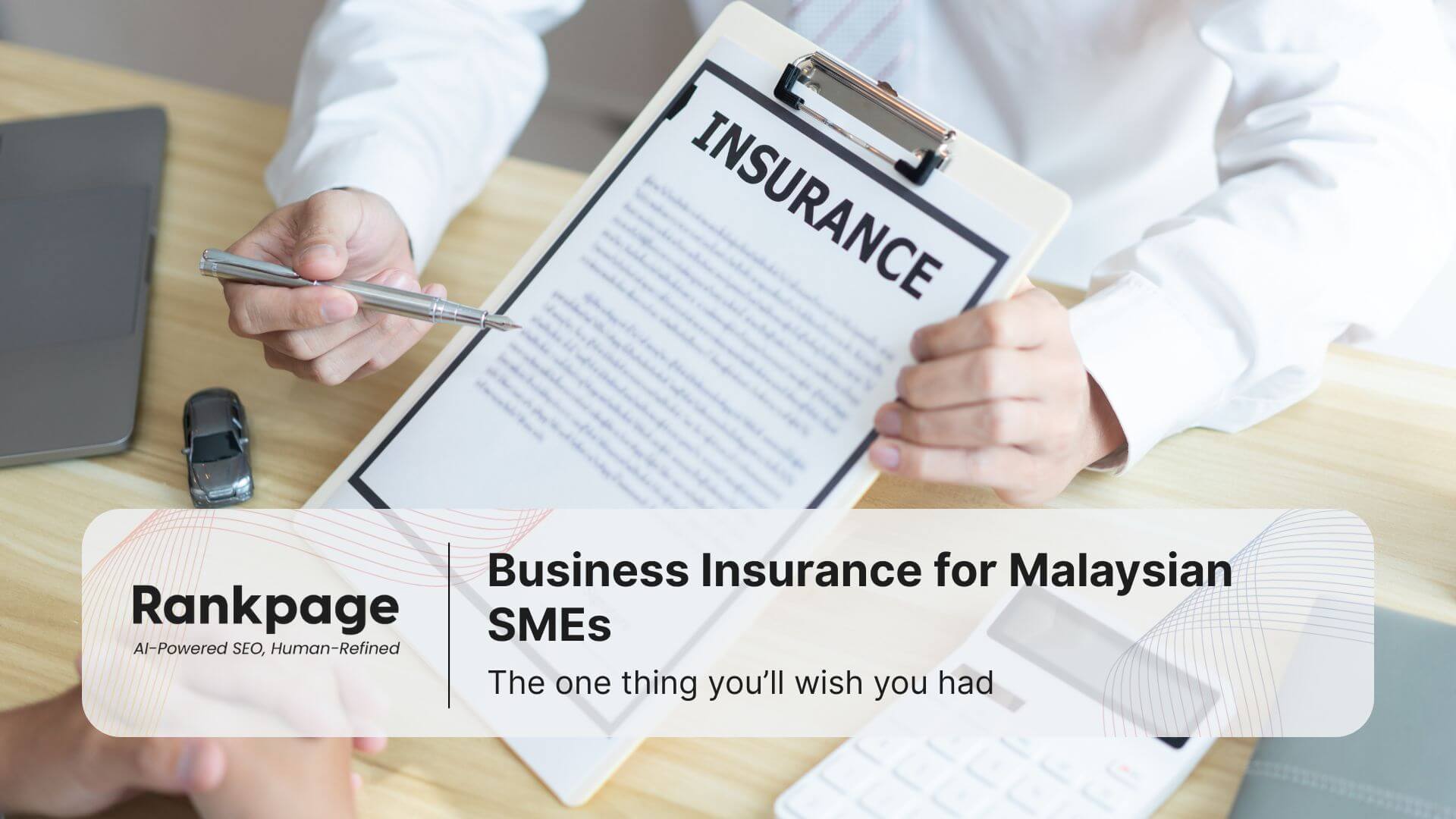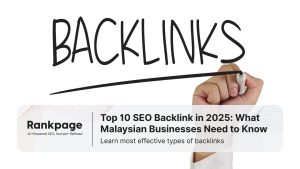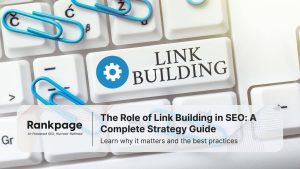Key Takeaways
- Business insurance protects SMEs from financial loss caused by property damage, lawsuits, accidents, theft, or employee claims.
- Some insurance types are legally required for Malaysian employers, such as SOCSO (PERKESO) contributions for eligible employees.
- A well-structured policy can ensure business continuity during unexpected events like fire, flood, cyberattacks, or third-party claims.
- Costs vary depending on coverage, but entry-level policies are affordable and often tax-deductible.
- Insurers offer SME-specific packages with flexible coverage across property, liability, group health, and cyber protection.
If you’re running a business in Malaysia, such as a small café in Penang, a logistics startup in Shah Alam, or an e-commerce brand shipping nationwide, you’ve probably poured in countless hours, effort, and capital.
But what happens if a fire breaks out in your office, a customer sues over a defective product, or an employee is injured on the job?
That’s where business insurance comes in.
With rising operational costs, cyber threats, and legal risks, SMEs can no longer afford to operate uninsured. Be it mandated by law or chosen voluntarily, insurance is fast becoming a core part of responsible business planning in Malaysia.
So, let’s break it down.
Table of Contents
What Is Business Insurance?
Business insurance is a financial product that protects your company from losses resulting from events like fire, theft, accidents, lawsuits, or employee injury.
In Malaysia, it’s offered by both conventional and takaful (Islamic) providers, and can be tailored for:
- Brick-and-mortar retail stores
- Online businesses
- Manufacturing SMEs
- Service-based enterprises (cleaning, design, consulting)
- Freelancers scaling up into Sdn Bhd companies
In simple terms: Business insurance helps cover the cost of damage, legal defence, medical bills, or compensation, so you don’t have to pay everything out-of-pocket.
Why Do SMEs in Malaysia Actually Need It in 2025?
SMEs are the backbone of Malaysia’s economy, making up over 97% of all business establishments. But they are also the most vulnerable to cash flow disruptions, legal disputes, and environmental risks.
Here’s why insurance is more of a necessity than a luxury for SMEs in 2025:
1. Natural Disasters Are Rising
Flash floods, fires, and storm damage are increasingly common, and costly. For instance, Malaysia’s December 2021 floods caused RM6.1 billion in direct losses.
Without property insurance or business interruption coverage, your business may be forced to shut down with no backup plan.
“Over 85% of SMEs are exposed to business interruptions from fire or property damage as they are not adequately covered.” — AIG Malaysia, 2018 report.
2. Legal Liability Is a Growing Threat
Customer slip-and-fall accidents, faulty product claims, or service-related disputes can lead to lawsuits.
With public liability insurance, you’re covered for compensation payouts and legal fees.
3. Workplace Accidents Can Lead to Prosecution
If your employees get hurt while working and you don’t have SOCSO coverage, you may face legal and financial penalties, especially in construction, manufacturing, or delivery-based jobs.
4. Cybercrime Is Targeting SMEs Too
Small businesses are often less protected from phishing, ransomware, or data theft.
A cyber insurance policy can cover IT restoration costs and even customer compensation in the event of a breach.
What Types of Business Insurance Should You Consider?
Every SME has different risks, so your insurance should be customised, not generic.
Here’s a breakdown of key insurance types Malaysian SMEs should consider:
Insurance Type | Best For SMEs That… | Why It Matters |
Public Liability | Have physical locations with foot traffic | Covers injury to third parties on your premises |
Fire & Property | Own office/shop space, equipment, or stock | Protects against fire, flood, theft, and vandalism |
SOCSO (Employment Injury Scheme) | Employ staff (locals, PRs, and foreign workers) | Mandatory in many industries; protects against staff injury |
Group Medical/Health | Want to attract and retain talent | Offers employee medical protection, enhances employer branding |
Business Interruption | Depend on daily operations or walk-in customers | Covers lost revenue if your business is forced to close |
Cyber Insurance | Store customer data or operate e-commerce | Shields against hacking, ransomware, and data breaches |
Product Liability | Sell physical goods (especially F&B or electronics) | Covers harm or injury caused by your products |
Our recommendation: Start with core coverage (fire, liability, SOSCO) and then expand as your business grows.
Is Business Insurance Mandatory for Malaysian SMEs?
While not every type of business insurance is legally required in Malaysia, there are certain coverages that are mandatory, and even “optional” ones may be required contractually or by landlords and clients.
Legally Required
- SOCSO (PERKESO): Employers must register and contribute for eligible employees. Foreign workers are covered under the Employment Injury Scheme, with Invalidity coverage extended from 1 July 2024.
- EIS (Employment Insurance System): Required for eligible Malaysian employees under Act 800.
- Foreign workers’ hospitalisation: SKHPPA (MOH) is compulsory for foreign workers treated at government hospitals.
Commonly Contractually Required
- Liability Insurance: Though general liability insurance is not universally required by law, many landlords, government tenders, and corporate clients demand proof of coverage before entering agreements.
- Public/General Liability: Often requested by landlords or in tenders/major client contracts.
Customizable Coverages
- Insurance providers like Allianz confirm that while some coverage types are not mandated, businesses can, and should, tailor insurance policies to suit their needs.
How Much Does Business Insurance Cost in Malaysia?
Premium rates vary widely depending on multiple factors such as your business type, size, coverage amount, location, and claims history.
General Liability Insurance (Estimated Typical Costs)
- Micro-enterprises or freelancers: RM500–RM1,000 per year
- Small businesses (under 10 employees): RM1,000–RM2,500 per year
- Medium businesses (up to 50 employees): RM2,500–RM5,000 per year
Other Insurance Types
- Property, Fire, Business Interruption, Cyber: Premiums depend on asset value, location, and business risk profile.
Premium Savings Tips
- Agents are typically compensated via commissions built into the premium (no separate fee in most retail cases).
- Lower premiums possible when you demonstrate effective risk controls, like security systems or fire prevention measures.
- Many business-purpose premiums (Professional Indemnity) are tax-deductible when incurred wholly and exclusively in producing income (see LHDN Public Rulings).
How to Choose the Right Business Insurance (Without Overpaying)
Let’s be honest, business insurance isn’t top of mind when budgeting for your café or consultancy. But the benefits far outweigh the cost, it just comes down to choosing a plan that fits your actual risk.
Here’s how Malaysian SMEs can do it smartly:
Start With Your Risk Profile
Different businesses carry different risks, so your insurance should reflect that.
- Operate a physical store or warehouse?
You’ll want fire and property coverage, plus public liability in case customers get injured on-site. - Hire full-time or contract staff?
You’re likely required to have SOCSO coverage. For better retention, add Group Medical. - Run an online business or store customer data?
Cyber insurance protects you from phishing, hacking, and ransomware attacks, especially important for Shopee/Lazada sellers and Instagram boutiques. - Sell physical products (F&B, electronics)?
Product liability insurance helps if a customer falls ill or gets injured from your item.
Use Licensed, Malaysia-Based Providers
Don’t settle for generalised “agent bundles” with unclear clauses. Stick with Bank Negara Malaysia-approved insurers that understand local business types and regulations.
Trusted names include:
- Allianz Business Shield
- Chubb FlexiGuard
- Tokio Marine SME+
- AIA SME
- Takaful Ikhlas BizTakaful
- UOB BizCare (for banked SMEs)
“Always get at least 3 quotes, check for “exclusions” (especially on water damage, theft, cyber), and confirm if the plan includes business interruption support.”
Bundle When You Can
Instead of buying multiple standalone policies, look for bundled SME plans. Many insurers offer packages with fire + liability + employee protection, saving you 20–30% yearly.
Review Policies Every Financial Year
Malaysian SMEs often forget to review policies after business growth, staff hiring, or premises upgrades.
Set a reminder to reassess insurance needs during your financial year-end or when renewing your business license (SSM/ROC).
Conclusion: Business Insurance Is a Shield, Not a Luxury
For Malaysian SMEs, business insurance isn’t just about preparing for the worst, it’s about enabling long-term success.
Having the right coverage in place means less sleepless nights and more confident decision-making. It can help you win contracts, stay compliant, retain staff, and recover from disaster, without draining your bank account.
If you haven’t reviewed your business insurance recently, now is the time. Here’s what we recommend:
- Assess your risk exposure: Property, people, digital assets, and liability
- Talk to a licensed agent or insurer: Get a custom plan for your industry
- Compare quotes and coverage: Don’t settle for the first (or cheapest) package offered
- Bundle policies where possible: For better coverage and savings
Disclaimer: The information provided in this article is for general informational purposes only and does not constitute legal, financial, or insurance advice. Rankpage, the leading SEO Agency in Malaysia, accepts no responsibility for any losses or damages arising from reliance on the information provided herein.
Frequently Asked Questions About Business Insurance For Malaysian SMEs
Is Business Insurance Compulsory For SMEs In Malaysia?
Not all types are compulsory. SOCSO coverage is mandatory for eligible employees. EIS applies to eligible Malaysian employees. Other covers (public liability, cyber) are optional unless required by contracts/landlords.
What Is The Minimum Insurance An SMEs Should Have?
Start with legally required protections (SOCSO/EIS as applicable). Then consider public liability, fire/property (add flood extension if relevant), and business interruption based on your risk profile.
How Much Does Business Insurance Cost In Malaysia?
Basic packages start from RM500/year for micro-businesses. Costs increase with coverage types, business size, and industry risks. Bundled SME packages can offer better value.
Can Business Insurance Help Me Win Contracts?
Yes. Many corporate clients, government tenders, and landlords require proof of insurance (liability or indemnity) before approving partnerships or agreements.
Do online businesses or freelancers need insurance?
Yes, especially cyber insurance and professional indemnity. If you handle customer data, process payments, or provide paid advice/services, insurance reduces your legal and financial risk.
Where can I get business insurance quotes in Malaysia?
You can compare plans through providers like Chubb, Allianz, Tokio Marine, UOB BizCare, or SME brokers like Contingent.com.my. Always consult a licensed agent for advice specific to your business.





